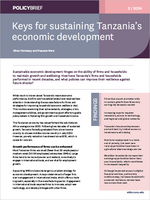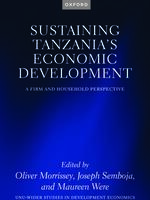Filter by...
Reset all
Publications (201)
Book Chapter
Public social insurance is part of the broader social protection “toolbox”, typically understood to comprise also social assistance measures (such as cash transfers, benefits in kind, fuel subsidies and so on), social services and public works (see, for example, Carter et al. 2019). Until recently...
Report
pdf
This report documents ZANMOD, the SOUTHMOD model developed for Zanzibar. This work was carried out by staff at Zanzibar University, the Second Vice President’s Office in Zanzibar, the University of Dar es Salaam, and the University of Dodoma, in collaboration with UNU-WIDER and SASPRI. The results...
Report
pdf
This report documents TAZMOD, the SOUTHMOD model developed for Tanzania Mainland. This work was carried out by University of Dar es Salaam in collaboration with the project partners. The results presented in this report are derived using TAZMOD version 2.9, which is part of the SOUTHMOD bundle...
Working Paper
pdf
– Re-thinking the use of unit values or community prices
Analysis of household food consumption patterns and welfare requires knowledge of household demand responses to changes in price and income. Estimation of the price and expenditure elasticities requires detailed data on household purchases and prices, which are often not available in many developing...

Sustainable economic development hinges on the ability of firms and households to maintain growth and wellbeing. How have Tanzania’s firms and households performed in recent decades, and what policies can improve their resilience against future shocks?Firms that export are better able to sustain...
Book Chapter
This peer-reviewed research is available free of charge. UNU-WIDER believes that research is a global public good and supports Open Access.
From the book:
Sustaining Tanzania's Economic Development
Book Chapter
This peer-reviewed research is available free of charge. UNU-WIDER believes that research is a global public good and supports Open Access.
From the book:
Sustaining Tanzania's Economic Development
Book Chapter
This peer-reviewed research is available free of charge. UNU-WIDER believes that research is a global public good and supports Open Access.
From the book:
Sustaining Tanzania's Economic Development
Book Chapter
This peer-reviewed research is available free of charge. UNU-WIDER believes that research is a global public good and supports Open Access.
From the book:
Sustaining Tanzania's Economic Development
Book Chapter
This peer-reviewed research is available free of charge. UNU-WIDER believes that research is a global public good and supports Open Access.
From the book:
Sustaining Tanzania's Economic Development
Book Chapter
This peer-reviewed research is available free of charge. UNU-WIDER believes that research is a global public good and supports Open Access.
From the book:
Sustaining Tanzania's Economic Development
Book Chapter
This peer-reviewed research is available free of charge. UNU-WIDER believes that research is a global public good and supports Open Access.
From the book:
Sustaining Tanzania's Economic Development
Book Chapter
This peer-reviewed research is available free of charge. UNU-WIDER believes that research is a global public good and supports Open Access.
Upgrading and multi-scalar industrial policy in the Tanzanian textile and apparel sector value chain
From the book:
Sustaining Tanzania's Economic Development

– A firm and household perspective
This book addresses performance and strategies adopted by firms and households in Tanzania to navigate shocks and achieve sustainability. How successful have firms and households been in building resilience to sustain their growth and development? Has the ability to navigate successfully through...
Journal Article
This peer-reviewed research is available free of charge. UNU-WIDER believes that research is a global public good and supports Open Access.
– A cross-sectoral analysis from a gender perspective
Mainland Tanzania has seen two decades of significant social policy reforms and transformations in its social and economic structures, whilst the country continues to grapple with persisting gender inequalities. This article examines Tanzania's social policy developments from a gender perspective...

– Latest addition to the SOUTHMOD programme
ZANMOD, the tax-benefit microsimulation model for Zanzibar, was launched in November 2023. The model will aid local authorities and researchers in understanding how taxation and social protection policies can be improved to reduce poverty and enhance equality.The research and coding work for the...
Displaying 16 of 201 results
 Join the network
Join the network